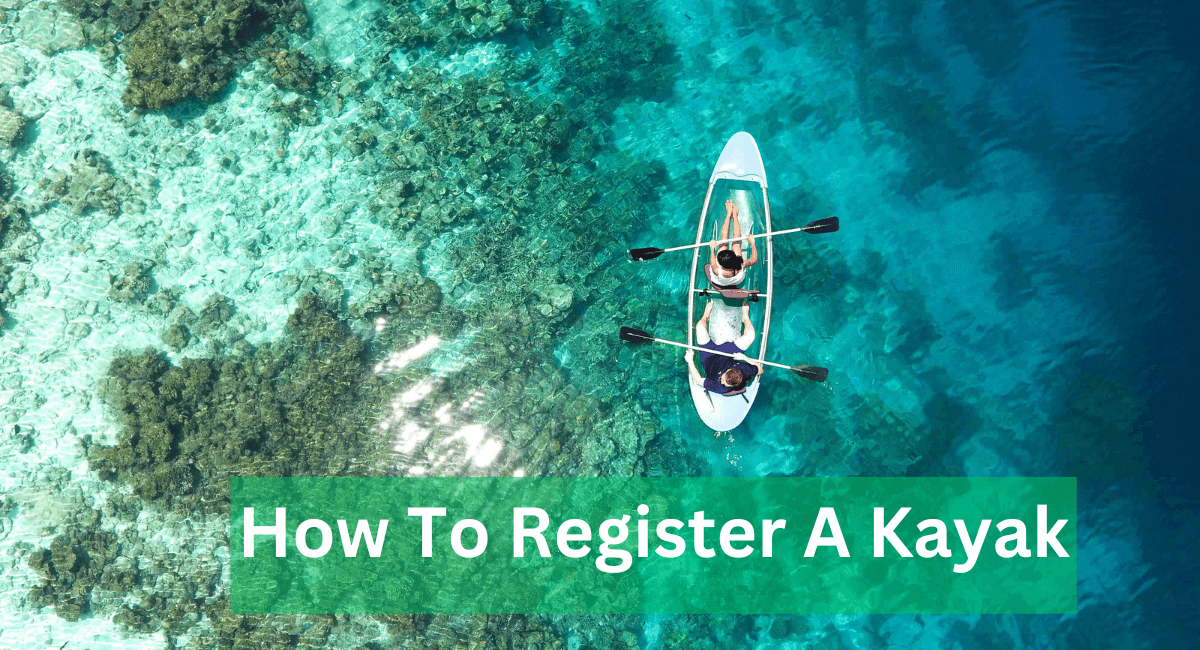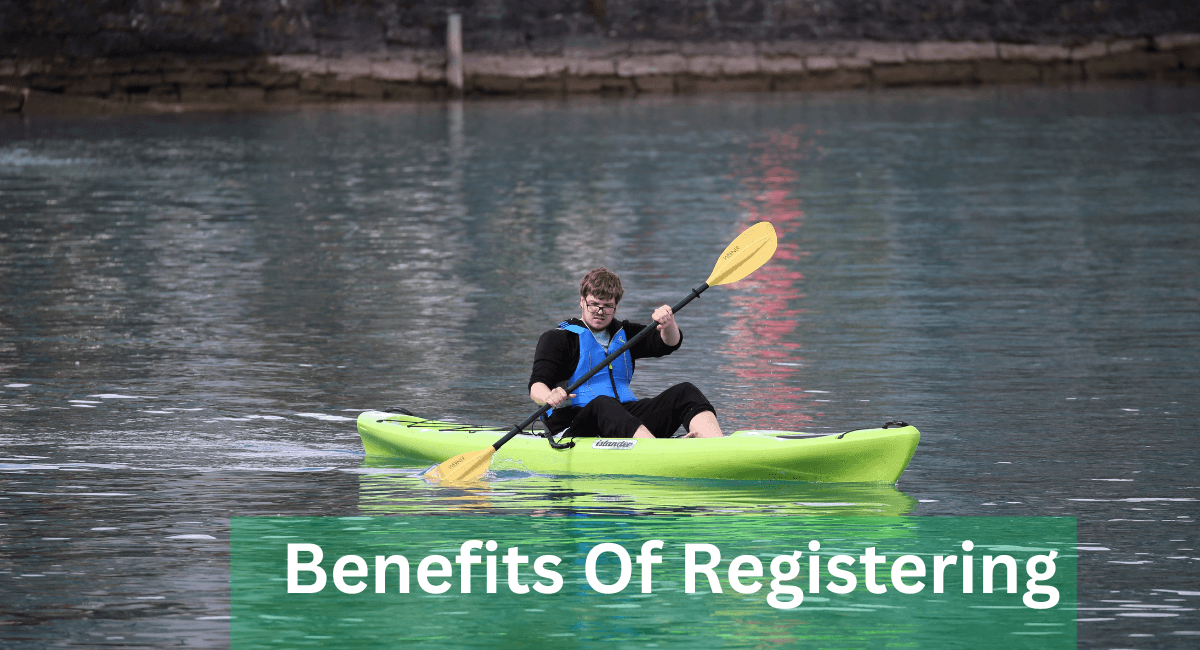A kayak needs to be registered when it is used for commercial purposes or has an engine, exceeding a certain horsepower, in some states. However, registration requirements can vary depending on the state and local regulations.
Therefore, it is essential to check the specific rules and regulations of the area where you plan to use your kayak to determine if registration is necessary. The process usually involves completing an application, providing proof of ownership, and payment of fees.
By following the applicable rules and registering your kayak when required, you can ensure compliance with the law and enjoy your kayaking activities without any legal issues.
Importance Of Registering A Kayak
Registering a kayak is crucial for ensuring compliance with legal requirements and promoting safety on the water. When a kayak is properly registered, it can be easily identified in case of emergencies and helps authorities track stolen or lost kayaks.
Legal Requirements For Kayak Registration
In many states and regions, kayaks need to be registered if they have a motor or sail. Some areas also require registration for non-motorized kayaks. It’s important to research and understand the specific regulations for kayak registration in your location to avoid potential penalties.
Potential Consequences Of Not Registering
Failure to register a kayak as required by law can result in fines and legal consequences. Additionally, unregistered kayaks may not be eligible for certain insurance protections. Moreover, in the event of theft, it can be challenging to recover an unregistered kayak without proper documentation.
Registration Criteria
In certain cases, you might wonder if your beloved kayak needs to be registered. Understanding the criteria that determine whether or not your kayak requires registration is crucial. Let’s delve into the specific factors that come into play when it comes to kayak registration.
Size And Type Of Kayak
The size and type of your kayak play a significant role in determining whether or not it needs to be registered. In most states, recreational kayaks are exempt from registration if they fall below a specific length, such as 13 feet, which can vary between jurisdictions. These regulations are in place to differentiate between recreational kayaks and larger vessels that do require registration.
Therefore, depending on the size and type of your kayak, you may be exempt from registration. It is important to check with the local boating agency or authorities in your area to determine the specific length requirement for registration.
Usage Location
The location where you plan to use your kayak is another crucial factor to consider when it comes to registration. Different states have different regulations regarding where kayaks need to be registered. For instance, some states require registration for all kayaks, regardless of usage location, while others may only require registration for kayaks that will be used in public waterways.
Public waterways, such as lakes, rivers, and coastal areas, often have stricter registration requirements to ensure the safety and proper monitoring of watercraft. However, if you only plan to use your kayak on private bodies of water, such as a privately owned pond or lake, you may be exempt from registration. Again, it is important to check with your local boating agency to understand the specific requirements in your area.
Additionally, certain areas within a state may have their regulations regarding kayak registration. For example, a city or county might implement specific registration requirements even if the state does not. It is crucial to acquaint yourself with the regulations not only at the state level but also at the local level to ensure compliance.
Remember, ignorance of the registration requirements is not an excuse and can result in penalties or fines. Therefore, it is always best to be well-informed and understand the registration criteria that apply to you based on the size, type, and usage location of your kayak.
Exceptions To Registration
A kayak needs to be registered unless it falls under certain exceptions, such as being used solely for non-commercial purposes, or if it is propelled solely by oars or paddles.
While it is essential to register your kayak in many cases, there are certain exceptions to keep in mind. These exceptions include non-motorized watercraft and temporary usage.
Non-motorized Watercraft
If your kayak is strictly non-motorized, the registration requirement may not apply. This means that if you paddle solely using your physical power and don’t have any external means of propulsion, such as an engine or a sail, you may be exempt from registration.
However, it’s important to note that the rules regarding non-motorized watercraft vary depending on your location. It’s always a good idea to check with your local authorities or the relevant governing bodies to determine if registration is required in your area.
Temporary Usage
In some cases, you may only use your kayak temporarily for recreational purposes. This temporary usage typically refers to situations where you borrow or rent a kayak for a short period. Since you won’t be keeping the kayak indefinitely, it might not be necessary to register it.
However, it’s crucial to understand the specific regulations in your area regarding temporary usage of kayaks. Local authorities may have different guidelines, so be sure to familiarize yourself with any requirements or exemptions that may pertain to borrowed or rented kayaks.
Conclusion
Understanding the exceptions to kayak registration will help you navigate the waters without any legal complications. Remember to double-check the rules and regulations specific to your location to ensure compliance with any registration requirements.
How To Register A Kayak

Kayaking is a popular and enjoyable outdoor activity, but it’s important to ensure that your kayak is properly registered. Registering your kayak is both a legal requirement and a safety measure, as it helps authorities keep track of watercraft and ensures proper identification in case of emergencies. So, if you’re wondering how to register a kayak, here’s a guide to help you understand the process.
Documentation Needed
Before starting the registration process, make sure you have the following documentation ready:
- Proof of Ownership: This could be a bill of sale, manufacturer’s statement of origin, or a notarized affidavit of ownership.
- Photo Identification: A valid government-issued ID, such as a driver’s license or passport.
- Boat Information: Details about your kayak, including its make, model, length, and hull identification number (HIN).
Registration Process
Once you have the necessary documentation, you can proceed with the registration process, which generally involves the following steps:
- Fill Out Registration Form: Obtain the registration form from your local boating authority or download it from their website. Fill it out with accurate and complete information.
- Submit Required Documents: Along with the completed registration form, submit the necessary documentation and any applicable registration fees.
- Receive Registration Certificate: Upon approval, you will receive a registration certificate, which should be kept on your kayak at all times as proof of registration.
Renewal And Transfer Of Registration
Kayak registration renewal and ownership transfer are essential processes to ensure compliance with regulations.
Renewal Process
To renew your kayak registration, fill out the renewal form with updated information and pay the applicable fees.
Verify the renewal requirements to avoid any penalties for an expired registration.
Transfer Of Ownership
When transferring ownership, submit a transfer application with details of the new owner.
Ensure all necessary documentation is completed accurately to finalize the ownership transfer.
Benefits Of Registering

Protection In Case Of Theft
Registering your kayak provides a legal framework to protect your investment in case of theft.
Legal Compliance
By registering your kayak, you ensure that you are in compliance with local regulations and avoid any potential fines.
Registration Fees
When it comes to kayaking, understanding the registration fees is an important aspect of staying compliant with local regulations. Knowing the costs involved and the validity period of registration is essential for kayak owners. It’s crucial to be aware of these details to ensure a smooth and enjoyable experience on the water.
Costs Involved
Registering a kayak typically incurs certain costs, which can vary depending on the specific location and regulations. These expenses could include a one-time registration fee and possibly an annual renewal fee. Some regions may also require additional charges for special permits or stickers.
Validity Period
The validity period of kayak registration also needs to be taken into account. Registrations may be valid for a certain number of years, after which they need to be renewed. It’s important to keep track of the expiration date to avoid any penalties for operating an unregistered kayak.
Frequently Asked Questions For When Does A Kayak Need To Be Registered
Do Kayaks Need To Be Registered For Recreational Use?
Kayaks typically don’t require registration for recreational use unless used in certain states or with motorized propulsion.
What Are The Registration Requirements For Kayaks?
Registration requirements for kayaks vary by state; generally, non-motorized kayaks for personal use don’t need registration.
Do Inflatable Kayaks Need Registration Like Traditional Kayaks?
Inflatable kayaks may require registration depending on the state regulations for watercraft, so it’s important to check locally.
Is Registration Mandatory For Kayaks Used In Public Waterways?
Most public waterways mandate registration for motorized kayaks, though regulations may differ for non-motorized kayaks used recreationally.
Conclusion
Understanding the regulations for kayak registration is crucial for all paddlers. Compliance with state laws and regulations is essential for ensuring a safe and enjoyable experience on the water. By familiarizing yourself with the requirements, you can avoid potential fines and penalties, and contribute to the preservation of natural resources.
